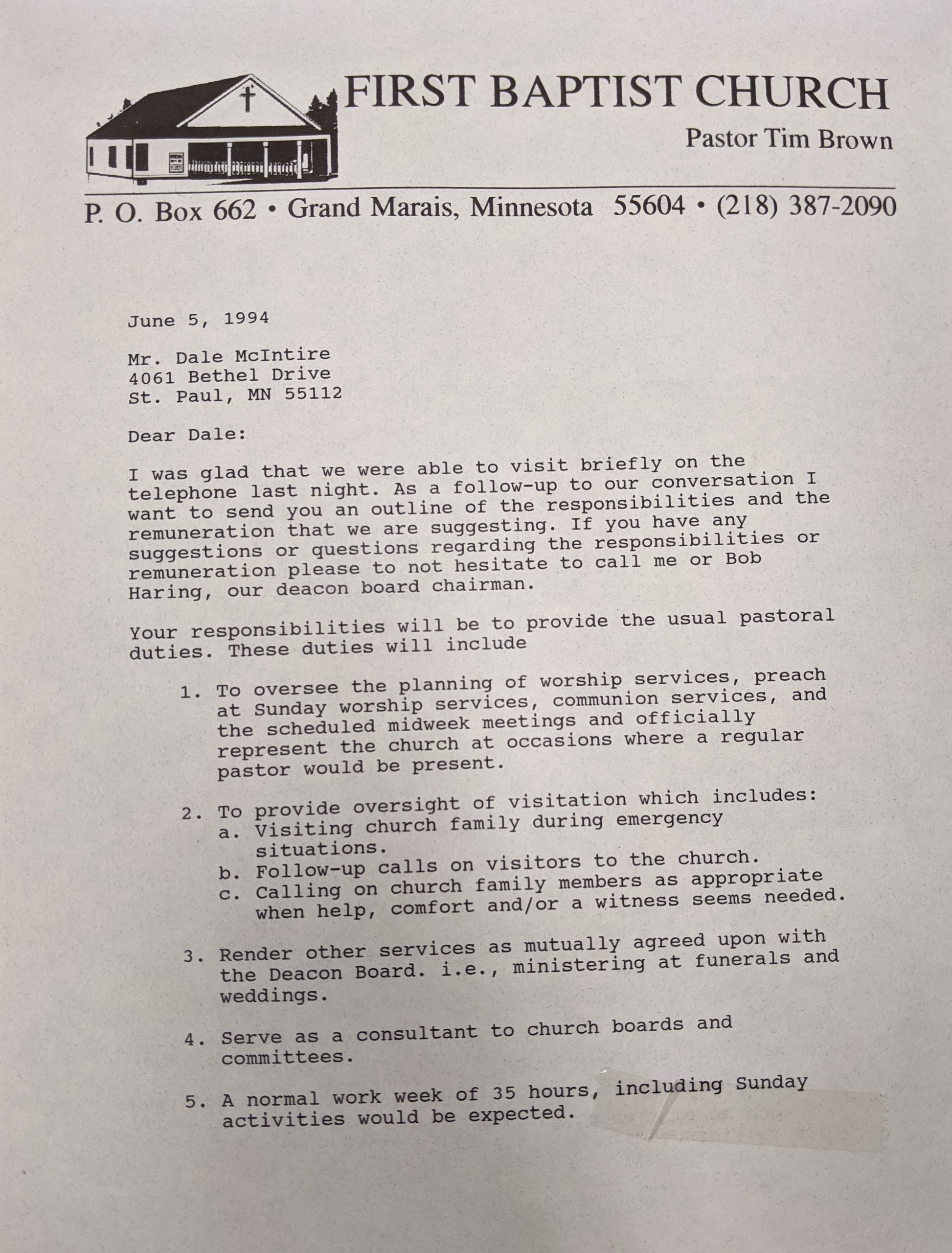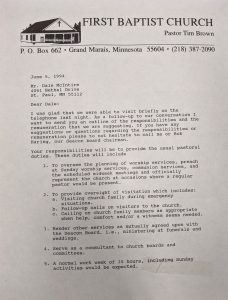
Job Description: Doulos
 It is one thing to tell someone how to become a Christian. It is another thing to explain to someone how to be a Christian. The first is a presentation of the gospel and a call to faith in Christ. The latter is a lifelong series of intentional teaching and intervention the Bible refers to as discipleship. The first is getting the job. The latter is learning the job description.
It is one thing to tell someone how to become a Christian. It is another thing to explain to someone how to be a Christian. The first is a presentation of the gospel and a call to faith in Christ. The latter is a lifelong series of intentional teaching and intervention the Bible refers to as discipleship. The first is getting the job. The latter is learning the job description.
The photo attached to this post is of an original job description sent to me on June 5, 1994. It describes the expectations of the congregation of First Baptist Church, Grand Marais, MN, for a young(ish) seminary student who will serve as interim pastor that summer. The list begins, “Your responsibilities will be to provide the usual pastoral duties.” The letter then goes on to provide five numbered, specific descriptions of those “usual pastoral duties:”
- “To oversee the planning of worship services, preach at Sunday worship services, communion services, and the scheduled midweek meetings and officially represent the church at occasions where a regular pastor would be present.
- “To provide oversight of visitation which includes:
- Visiting church family during emergency situations.
- Follow-up calls on visitors to the church.
- Calling on church family members as appropriate when help, comfort and/or a witness seems needed.
- “Render other services as mutually agreed upon with the Deacon Board, i.e., ministering at funerals and weddings.
- “Serve as a consultant to church boards and committees.
- “A normal week week of 35 hours, including Sunday activities would be expected.”
That list, for all it included, proved far too short, but it was a start.
Paul offers something of a job description for a doulos of Christ in Ephesians 6. He is instructing people who serve masters as actual slaves how to conduct themselves as Christ-followers in that life context. His words are equally instructive for those who through faith in Christ surrender ourselves to be His douloi (slaves).
Ephesians 6:5-8 (ESV)
5 Bondservants, obey your earthly masters with fear and trembling, with a sincere heart, as you would Christ, 6 not by the way of eye-service, as people-pleasers, but as bondservants of Christ, doing the will of God from the heart, 7 rendering service with a good will as to the Lord and not to man, 8 knowing that whatever good anyone does, this he will receive back from the Lord, whether he is a bondservant or is free.
Here is the job description for a faithful doulos:
- Obey your master with fear and trembling (respect and submission).
- Obey your master with a sincere heart (without hypocrisy, falsehood, or deceit.)
- Obey your master not as people-pleasers (not as those who do what they do just to get by or make brownie points with only their own self interest in mind but with integrity and genuine devotion)
- Obey your master doing the will of God from the heart (with earnest desire to do what is right)
- Obey your master rendering service with good will (not grudgingly, angrily, or with any hint of disdain)
- Obey your master as to the Lord and not to man (serve as an act of worship that exceeds and elevates the task)
- Obey your master with the expectation of divine compensation (confident that God repays good with abundant goodness.)
Now, folks, if earthly slaves who are Christians are to serve and obey earthly masters (who may or may not be Christians) in this manner, how much more should our service of Christ reflect these same criteria?!
One thing seems clear to me. When Paul identifies himself and his fellows believers as douloi, he is not elevating himself or us to partnership with Christ. Our relationship with Christ is more complex than the simple master/slave relationship, truly, but it is not less than that relationship. Too often, I think, we fall to the temptation to think that because we we are loved, accepted, adopted, and transformed by God through faith in Christ we somehow become equal with Christ, that His commands and instructions in our life are subject to mutual negotiation as among peers. That is not the perspective Paul, inspired and moved by the Holy Spirit to reveal the mind and heart of God, presents in his application of the word doulos (slave) to the genuine follower of Jesus.
How do we become doulos? Paul describes it as a calling to belonging.
Romans 1:1 (ESV) Paul, a servant (doulos) of Christ Jesus, called to be an apostle, set apart for the gospel of God,
Romans 1:6 (ESV) including you who are called to belong to Jesus Christ,
We’ll take up the idea of “calling” and “belonging” in the next posts. In the meantime, consider your life as a follower of Jesus. In what ways do you demonstrate the reality of doulos? In what ways does your life disguise the reality of doulos? What are you going to do in faith and in reliance on the Holy Spirit to actuate the reality of doulos in your life moving forward?


No Comments